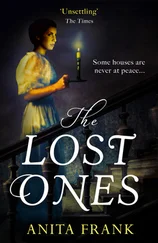“He? Who?”
“Staniker, of course. Garry Staniker, that brutal bastard who somehow got to own me, Oliver. I kidded myself. I thought I could lift my head and begin to live again. I cheated myself and I cheated you. I’m so — so terribly ashamed.”
Then she told him the story of a silly woman, of a short cruise on the Odalisque, a faked breakdown, a lonely anchorage, too much to drink, of fighting him off until it seemed easier to let him have his way. The boy looked stunned and sickened. She sighed, “After that, I guess I stopped caring for a while. I’m a mature woman. I had a married life for a time. He’s a very clever sensuous brute, you know. It was purely physical, dear, not like what you and I have. But I can’t lie to you about it. I got pleasure from it. He saw to that. Finally I realized I had to get out of the trap. I tried. God knows I tried. I thought that by selling the boat I’d be rid of him. So he started coming here. I fought it. Believe me, I fought it. But he is a strange man. I think there’s something sick and wrong and dangerous about him. He’d laugh at me when I begged him to let me alone. When I irritated him too much, he’d beat me. He’s told me that no woman he’s ever had has walked out on him, and no one ever will, and that until he gets tired of me, I have no choice at all. When he comes back, Oliver, it will all be the same as it was before. There’s nothing either of us can do about it. I even tried to kill myself once, but I didn’t have the courage.”
The words bowed his strong, young shoulders, made his face pale and sweaty, gave him a nauseated look.
“You’ve been a miracle I didn’t deserve, Oliver. I should have known it couldn’t be really true, to have you make me feel so proud, and so cherished. Please leave, dear. Right now. I’ll never forget you.”
“I can’t leave you!”
“Now is the time to leave me. He’s hurt, and it will be weeks, maybe, before he comes back. His wife is gone now. I think what he’ll do is move in here with me, and there’s no way in the world I can stop him. I’m a coward, dear. He’s trained me, with those beatings. He knows all the ways to hurt.”
He came lurching to her, bungling and clumsy, to hold her and make his groaning sobs and protests, his young heart in a terrible agony and, she knew, under the agony was the sly desire to keep on having her as long as he could.
With great reluctance she at last accepted the compromise she had sought. “All right then. We’ll be selfish, Oliver. We’ll crowd our whole lifetime into whatever time there is left before he comes back. From now on we’ll pretend there isn’t any ending to us.”
He began to make brave sounds about how he would drive Staniker away from her and keep him away. “Shush, darling. Let’s not spoil the time left by talking ugliness and silliness and things that won’t happen. Just — love me. Make me forget everything but you.”
Afterward, she studied his face in his heavy sleep, in the indirect glow of the bedside light. He looked haggard, yet very young, like a child after too much carnival, tickets for every ride, the belly queasy under the weight of candied apples.
As she got up and closed the interconnecting doors so she could take her shower without awakening him, she remembered how Spook used to talk about them. Spook had acting talent and a sense of mischief and a contempt for the men she could hook. “Look, kid, what have they got? They’ve got the drearies, these sad dull little jobs and houses and wives and irritating kids. The movies and the TV people have these huge, glamorous problems, and the marks feel left out. So along with the trick I give them a little theater, like maybe my old man is a U.S. Senator and he’s spent thousands trying to find me, or I have a rare and unusual kind of blood disease I caught in Arabia. I like to cry a little. Where else are these drearies going to buy genuine romantic stuff? Put them through the wringer, kid, and you establish a nice repeat business and a little bonus on the sly to help you out with your problems.”
As she was lazily drying herself after her shower she found herself reaching further back into memory, back to one of the games of her childhood. It had been years since she had thought of it, and she did not know what had brought it to the surface just now.
Each Sunday at the Home, when they filed out of the hall after supper, there would always be a bowl of those round hard candies on the table by the door, and old Satchel-ass would be sitting behind the table watching it like an eagle. If you had a dining-hall demerit that week, you got waved on by. If not you could take one, picking it up between thumb and first finger with the other fingers curled out of the way so you could have no chance to get more than one. They were each wrapped in a twist of white waxy paper, so that the color showed through, but if you hesitated to look for a color you wanted, she’d wave you by and your chance was gone.
Some of the kids chomped theirs up as they walked out of the building, and others rolled it on their tongue to make it last a long time, and if you stuck it back in the pocket of your cheek behind your teeth, it would last practically forever. But she had always saved hers for the games of Last One Left.
About nine or ten girls was the best number, each putting in one candy, and you had to look inside the paper to be sure nobody had wrapped up one already sucked a little. You drew the hopscotch squares on the cement playground with the edge of a piece of shale, with one candy in a corner of each square, making the jumps hard enough so that on the very first time some would jump onto a line, or lose their balance when they picked up one of the pieces, and it would be weeded down until only the winner was left, and the nine or ten pieces belonged to her.
Crissy won more consistently than anyone except a tall spry skinny colored girl named Shacks. When Shacks won she would stand and whinny with crazy laughter, and go whinnying off with the candy, until finally she got on everyone’s nerves so badly Crissy and three others had cornered her in the john after lights out. It had taken a long time and a lot of effort to make her start crying, and it wasn’t until then they found out she was so damned dumb she’d thought it was Laughs One Left, and the whinnying was because she thought it was the name of the game.
Crissy remembered the pleasure of being the Last One Left, and often, after winning she would save the treasure until lights out, and then unwrap as many as six in a row, putting each one in her mouth and trying to identify the flavor, then roll them around with her tongue until all flavors blended, and finally chomp them all into sweet splinters and powder and juice, knowing that in all the nearby beds the ones still awake could hear the night feast and know what it was.
On Saturday afternoon, the day after Staniker was brought back to Nassau, when Sam Boylston returned to his room at the Nassau Harbour Club, Jonathan Dye seemed unchanged in any way. He was still sitting in the straight chair by the desk, hunched and miserable, arms resting on his knees, knuckly hands dangling.
His color was poor, eyes puffy, his beard a dark shadow on the angular jaw and long throat.
He looked up and nodded absently at Sam, then directed his stare back toward the nubby texture of the gray rug.
Sam put a package on the bed and said, “I’ve got permission to talk to the Barths and the Hilgers. Sir Willis fixed it up.” The boy did not answer. Sam said, “You can see their point. The reporters got their story from those people before the police could stop them. It was second hand. Nobody can be certain it’s what Staniker actually told them. They could get some details wrong. So it’s better to wait for the results of the interrogation of Staniker and keep reporters away from those people. People usually have a tendency to dress a story up when they’re the center of attention. It makes them more important. They’ve been questioned by the authorities now. But the results of that won’t be released to the press. Their boat is tied up at Yacht Haven. Want to go down there with me in a few minutes? Jonathan!”
Читать дальше
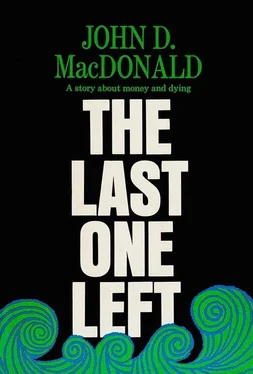

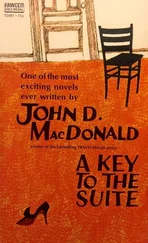
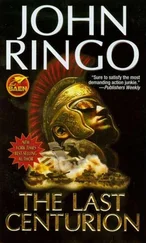


![Джон Макдональд - Wine of the Dreamers [= Planet of the Dreamers]](/books/430039/dzhon-makdonald-wine-of-the-dreamers-planet-of-thumb.webp)

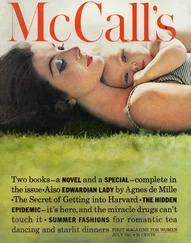
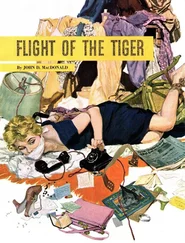
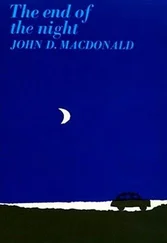
![Джон Макдональд - The Hunted [Short Story]](/books/433679/dzhon-makdonald-the-hunted-short-story-thumb.webp)
